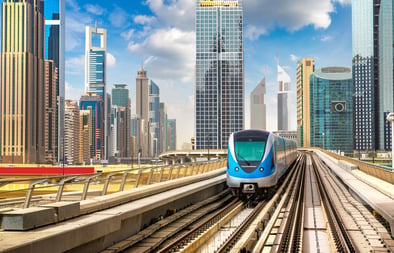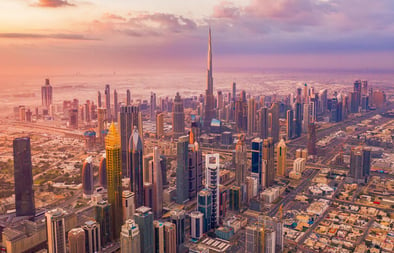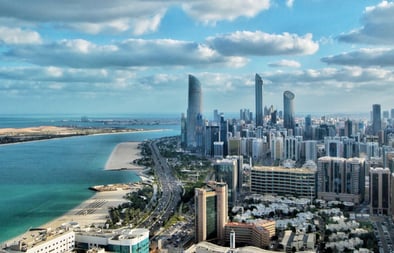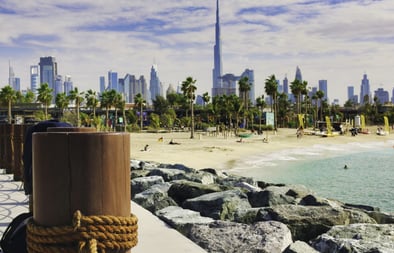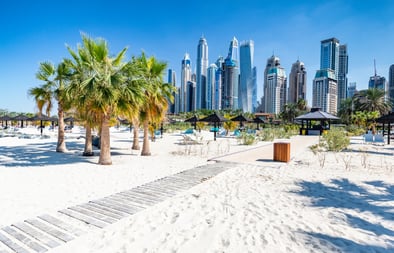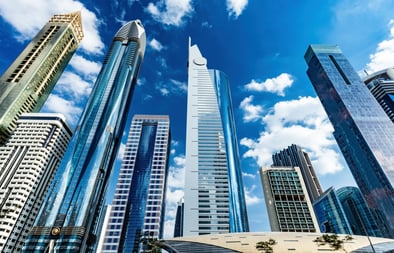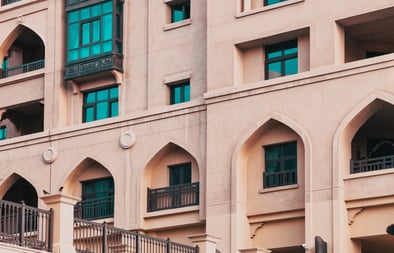
Dubai's real estate landscape has been fundamentally reshaped by the implementation of freehold property laws, a watershed moment that has had far-reaching implications for both local and international investors. Under these laws, non-UAE nationals gained the unprecedented right to own property in designated areas, marking a departure from the previous system where ownership was restricted to Emirati citizens and certain nationals of Gulf Cooperation Council countries.
The introduction of freehold property laws sparked a surge in real estate activity, attracting a flood of investment into Dubai's burgeoning property market. This influx of capital fueled a construction boom, giving rise to iconic landmarks and transforming the city's skyline. From luxurious residential towers to sprawling commercial developments, Dubai became a global hotspot for real estate investment, offering a diverse array of properties catering to various preferences and budgets.
Understanding Dubai's freehold property law is paramount for anyone looking to engage in real estate transactions within the Emirate. Key aspects of these laws include clear delineation of ownership rights, regulations governing property transfers and registration, and provisions for dispute resolution. Additionally, freehold property ownership confers certain privileges and responsibilities, such as the right to lease, mortgage, or sell the property, as well as the obligation to comply with community regulations and maintenance fees.
For investors, freehold property ownership in Dubai presents a wealth of opportunities, from potential capital appreciation to rental income generation. However, navigating the complexities of the real estate market requires a nuanced understanding of legal frameworks, market dynamics, and investment strategies. This guide aims to demystify these intricacies, offering insights into property valuation, market trends, financing options, and legal considerations to empower investors to make informed decisions.
Furthermore, Dubai's freehold property law is subject to periodic revisions and updates in response to changing market conditions and regulatory requirements. Staying abreast of these developments is crucial for investors and property owners to mitigate risks and capitalize on emerging opportunities.
Dubai's freehold property law has played a pivotal role in shaping the Emirate's real estate landscape, ushering in an era of unprecedented growth and prosperity. By understanding the intricacies of these laws and staying informed about market trends, investors can navigate the dynamic real estate market with confidence and capitalize on the myriad opportunities it offers
Unveiling Freehold Property Law
Definition and Concept of Freehold Property: In our exploration, we delve deep into the multifaceted concept of freehold property, unraveling its intricate layers and shedding light on its profound significance for property owners and investors alike. With a nuanced understanding of freehold ownership, individuals gain a comprehensive perspective essential for navigating the ever-evolving terrain of Dubai's dynamic real estate landscape. Through a meticulous examination of the principles underpinning freehold property, we illuminate the path towards informed decision-making and strategic investment in one of the world's most vibrant real estate markets.
Evolution of Freehold Property Law in Dubai: Trace the evolutionary trajectory of freehold property laws in Dubai, from their inception to the present day. Explore the pivotal milestones and legislative developments that have shaped the Emirate's real estate sector and transformed its property ownership landscape.
Legal Framework Governing Freehold Property Ownership: Gain insights into the legal framework that governs freehold property ownership in Dubai. We examine the statutory provisions, regulations, and governmental policies that underpin the rights and obligations of freehold property owners, ensuring a comprehensive understanding of the legal landscape.
Rights and Responsibilities of Freehold Property Owners: Explore the rights bestowed upon freehold property owners, including the freedom to transfer, lease, or mortgage their properties. Conversely, we delve into the attendant responsibilities, such as compliance with community regulations, maintenance obligations, and adherence to zoning laws.
Distinction Between Freehold and Leasehold Properties: Highlighting the distinctions between freehold and leasehold properties, we elucidate the nuances that differentiate these forms of property ownership. Understanding these distinctions empowers investors to make informed decisions and strategize their real estate portfolios effectively.
Historical Context of Freehold Ownership in Dubai: Embark on a journey through the historical context of freehold ownership in Dubai, tracing its roots and evolution over time. Uncover the socio-economic factors and geopolitical dynamics that have influenced the adoption and expansion of freehold property laws in the Emirate.
Key Components of Dubai's Freehold Property Law
Understanding Title Deeds and Ownership Rights: Gain profound insights into the significance of title deeds and the ownership rights they confer upon property owners. Understanding the nuances of title deeds is essential for establishing legal ownership and asserting property rights in Dubai's competitive real estate market.
Registration Process for Freehold Properties: Navigate the registration process for freehold properties with clarity and confidence. From document submission to government approvals, we unravel the procedural intricacies involved in registering freehold properties, ensuring compliance with regulatory requirements and facilitating seamless transactions.
Transfer of Ownership and Title Deeds: Explore the mechanisms governing the transfer of ownership and title deeds in Dubai's freehold property market. Understand the legal procedures, documentation requirements, and transfer fees associated with property transactions, empowering buyers and sellers to navigate the transfer process efficiently.
Regulations Governing Property Development and Sales: Examine the regulatory framework governing property development and sales in Dubai. From zoning regulations to building codes and design guidelines, we elucidate the regulatory standards that developers and investors must adhere to when conceptualizing, constructing, and marketing freehold properties.
Escrow Accounts and Consumer Protection Mechanisms: Explore the role of escrow accounts and consumer protection mechanisms in safeguarding the interests of property buyers and investors. Understand how escrow accounts mitigate financial risks associated with off-plan property purchases and ensure transparency and accountability in real estate transactions.
Compliance with Building Codes and Regulations: Navigate the labyrinth of building codes and regulations governing property development and construction in Dubai. From fire safety standards to environmental sustainability requirements, we dissect the compliance obligations that developers must meet to ensure the safety, durability, and integrity of freehold properties.
Role of Regulatory Authorities in Freehold Property Governance: Uncover the pivotal role of regulatory authorities in governing Dubai's freehold property market. From the Dubai Land Department (DLD) to the Real Estate Regulatory Agency (RERA), we explore the functions and responsibilities of regulatory bodies in enforcing property laws, resolving disputes, and upholding industry standards.
Implications of Freehold Property Law for Buyers and Investors
Advantages of Freehold Property Investment: Investing in freehold properties offers a myriad of benefits, including ownership rights, flexibility in usage, and the potential for long-term capital appreciation. With freehold ownership, investors gain greater control over their assets and the freedom to leverage their investments for various purposes. This flexibility empowers investors to optimize their portfolios and maximize returns, positioning them for financial growth and prosperity in Dubai's dynamic real estate market.
Economic Impact of Freehold Ownership: Stimulate economic growth by attracting foreign investment and fostering property development. Create employment opportunities in related sectors, contributing to overall economic vitality.
Market Trends and Demand: Delve into the factors fueling demand within Dubai's real estate market, including urbanization, population growth, and infrastructure development. By examining these trends, investors can better understand the dynamics driving demand for freehold properties. Furthermore, exploring evolving consumer preferences provides insights into the changing needs and desires of property buyers and investors. Armed with this knowledge, stakeholders can make informed decisions and capitalize on emerging opportunities in Dubai's vibrant real estate landscape.
Factors Influencing Property Prices: Examine location, amenities, market sentiment, and macroeconomic trends impacting property valuation. Understand variables contributing to the long-term appreciation of freehold properties.
Legal Protections for Owners: Explore title guarantees, dispute resolution mechanisms, and regulatory safeguards. Ensure the security and integrity of freehold property ownership under Dubai's legal framework.
Taxation and Financial Considerations: Navigate tax implications, transaction costs, financing options, and wealth management strategies. Make informed financial decisions regarding freehold property investments.
Impact of Global Economic Trends: Assess the influence of currency fluctuations, interest rates, and geopolitical instability. Understand how global economic factors shape investor sentiment and market dynamics in Dubai's freehold sector.
Rights and Obligations of Freehold Property Owners
Property Use and Transfer: Owners have the right to use, lease, and transfer property ownership under Dubai's freehold laws.
Maintenance Responsibility: Owners must maintain and repair their properties to preserve their value and integrity.
Adherence to Community Rules: Compliance with community regulations ensures harmonious living environments.
Participation in Community Governance: Active involvement in HOAs and committees fosters community cohesion and decision-making.
Dispute Resolution: Owners have recourse to mediation, arbitration, or legal action to resolve conflicts.
Environmental Compliance: Compliance with environmental standards promotes sustainability and resource conservation.
Contribution to Community Development: Owners play a role in enhancing their communities through participation in events and initiatives.
Key Considerations for Prospective Buyers and Investors
Conducting Due Diligence on Freehold Properties: Prior to making any investment decisions, it's imperative to conduct thorough research on the background, history, and legal status of freehold properties. This involves scrutinizing property records, examining title deeds, and verifying ownership documentation. Additionally, it's essential to investigate any existing encumbrances or legal disputes associated with the property. By undertaking comprehensive due diligence, investors can mitigate risks and ensure that their investment aligns with their objectives and expectations.
Evaluating Location, Amenities, and Infrastructure: Assess the proximity to key amenities, transportation hubs, schools, healthcare facilities, and recreational areas.
Financial Planning and Mortgage Considerations: Evaluate affordability, explore mortgage options, and plan for associated costs such as down payments, closing fees, and ongoing maintenance expenses.
Engaging Legal and Real Estate Professionals for Guidance: Seek advice from experienced legal advisors and real estate professionals to navigate complex legal requirements and contractual obligations.
Negotiating Purchase Agreements and Sale Contracts: Ensure clear terms and conditions in purchase agreements, including timelines, payment schedules, and contingencies.
Conducting Due Diligence on Freehold Properties: Prior to making any investment decisions, it's imperative to conduct thorough research on the background, history, and legal status of freehold properties. This involves scrutinizing property records, examining title deeds, and verifying ownership documentation. Additionally, it's essential to investigate any existing encumbrances or legal disputes associated with the property. By undertaking comprehensive due diligence, investors can mitigate risks and ensure that their investment aligns with their objectives and expectations.
Future Trends and Developments in Dubai's Freehold Property Market
Emerging Trends in Property Development and Design: Explore evolving trends in architectural design, urban planning concepts, and lifestyle amenities that shape the future of property development in Dubai.
Technological Innovations Shaping the Real Estate Industry: Embrace advancements in technology such as virtual reality tours, smart home automation systems, and blockchain-based property transactions that revolutionize the real estate sector.
Sustainable Practices and Green Building Initiatives: Emphasize the growing importance of sustainability and eco-friendly construction practices, including LEED certification, solar energy integration, and water conservation measures.
Regulatory Changes and Policy Reforms Affecting Freehold Property
Ownership: Stay abreast of regulatory reforms, legal amendments, and policy initiatives by government authorities that influence freehold property ownership rights, taxation policies, and investment regulations.
Forecasting Market Growth and Investment Opportunities: Analyze market projections, economic indicators, and investment forecasts to identify emerging growth sectors, investment hotspots, and lucrative opportunities in Dubai's freehold property market.
International Impact of Dubai's Freehold Property Market: Assess the global influence of Dubai's freehold property market on international investors, cross-border capital flows, and strategic partnerships with foreign stakeholders.
Role of Freehold Property Market in Dubai's Economic Diversification
Efforts: Recognize the pivotal role of the freehold property market in Dubai's economic diversification agenda, including its contribution to GDP growth, job creation, and fostering entrepreneurship in the real estate sector.
Conclusion:
Dubai's freehold property law serves as the cornerstone of the emirate's flourishing real estate sector, offering a gateway to unparalleled opportunities for investors on both local and global scales. As Dubai solidifies its status as a premier destination for real estate investment, a deep understanding of freehold property law becomes indispensable for navigating the complexities of property ownership and investment dynamics. By embracing the insights elucidated in this guide, individuals can empower themselves with the knowledge necessary to make well-informed decisions and capitalize on the expansive potential of Dubai's freehold property market. With a fusion of legal proficiency, market acumen, and strategic foresight, investors can embark on a transformative journey toward wealth accumulation and prosperity in Dubai's dynamic and thriving real estate landscape, shaping a prosperous future for themselves and contributing to the enduring legacy of Dubai's real estate prowess.


























